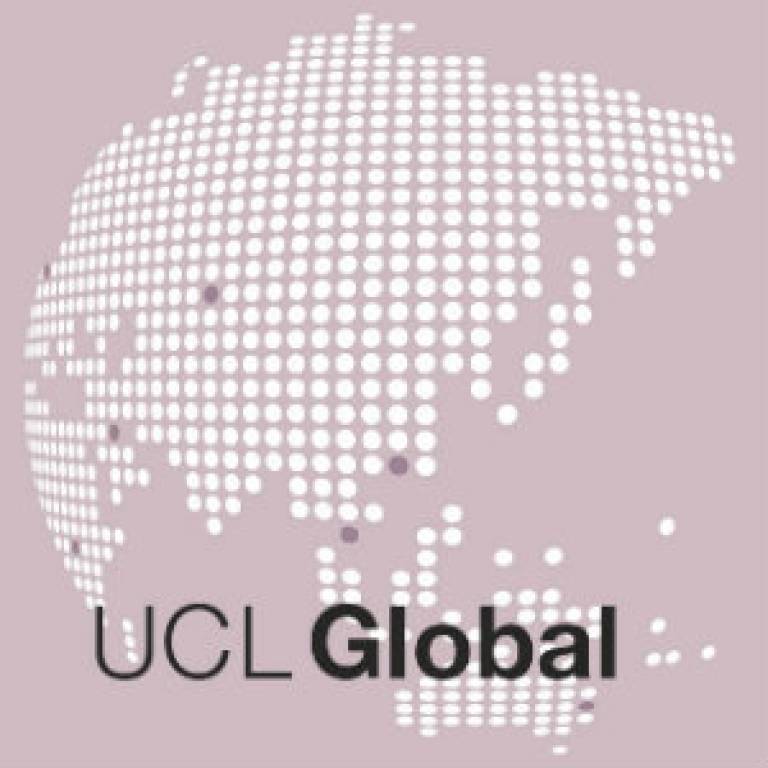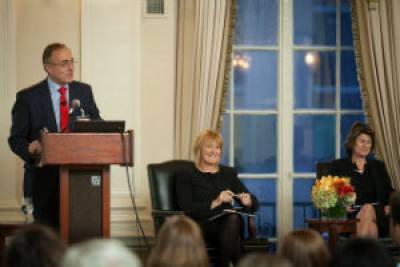Vice-Provost's View: London's Global University, Globally Engaged
7 November 2014
Thank you to the several hundred UCL colleagues who completed our survey on the new Global Engagement Strategy, and the 100+ who came to the Town Hall event on 14 October which marked the formal opening of the consultation.

We kept the survey open for an extra week, by popular demand, from 2-24 October. The Office for International Affairs team are now working through your responses, and feeding them back into the series of smaller consultation events we're having with each faculty, plus other groups of staff and students. The Global Engagement Executive Group now includes a student member as well as two vice provosts, two deans and two directors, and meets for the third time on 19 November.
The following headlines from the survey responses stand out for me so far:
- 60% of the input came from academic staff and 40% from professional services. That's a good mix of the people who create and share knowledge and those who support them to create and share it
A high percentage of you want us to:
Get better at 'mapping' and sharing information about our existing international activities
- Develop a finite set of strategic international partners
- Use our alumni networks overseas better
- Give more of our students the experience of a period of studying abroad
- Influence government immigration policy
Lots of you don't want us to:
- Go in for overseas campuses (we won't)
- Set up further niche campuses overseas (no intention of doing that either)
- Increase international student recruitment (not currently an explicit objective nor likely to be a major driver of our new global engagement strategy - we want to focus on quality not quantity. That's one of the reasons why we've shifted from referring to an 'international' or 'internationalising' strategy - those are usually associated with overseas recruitment - to a 'global engagement' strategy; however we do need to continue to keep a close eye on recruitment patterns and trends and diversify our recruitment markets)
- Develop proposals for a China Centre, India Centre etc. (which surprised me, given the agreed plans for an Institute of Advanced Studies with associated 'area centres'. We'll need to have more conversations to understand what's behind this)
So, we're building up a picture of how London's Global University can and should have the global impact that UCL 2034 commits us to.
Developing an approach to partnership
A thoughtful understanding of partnership will be central to the whole Global Engagement Strategy; 'partnership' is a word that can have many meanings. As a Pro-Vice Chancellor involved in setting up branch campuses in Malaysia and India once said, "There are as many ways of partnering as there are partners."
The UCL Bartlett's International Strategy, which I've discussed a lot with their Dean, Professor Alan Penn, and Vice-Dean (International), Caren Levy, talks about partnerships of equivalence. The Bartlett International Strategy also talks about generosity of spirit. Both those concepts fit well with UCL's founding ethos and underlying values, and also develop Professor Michael Arthur's references to UCL wanting to be a 'generous partner' - generous in the sense of sharing, listening and learning, not assuming we have a monopoly on wisdom. But not underestimating, either, what a research powerhouse, in a magnet city we are - offering a rich, internationally relevant education to our students and with strong entrepreneurial drive.
Because we take partnership seriously, we're also inviting the views of UCL alumni and friends on our emerging Global Engagement Strategy. Starting next door, I've been looking carefully at the Institute of Education's Internationalisation Strategy, and discussing it with Director, Professor Chris Husbands and International Office Director, Mike Winter.
In New York and Hong Kong last month, the Provost and I were listening to what our alumni and university partners like HKU and PKU think. (I can't remember what Hazel Genn and I were smiling at - it certainly wasn't the aircon, which was set to freezing cold!)

In New York, the alumni group we got together with over breakfast reminded us not to overlook the place of sport in building and maintaining affinity with UCL. In Hong Kong last week, our alumni there encouraged us not to forget the powerful example our Nobel Prize winners offer or the role music can play in maintaining affinity with UCL - and how important regular visits by UCL's deans can be to attracting the very best students and keeping conversion rates high. Hazel Genn sets a high standard for this in Hong Kong, and shows just how effective our deans can be as UCL ambassadors abroad.
We've concluded, jointly with Yale, that the UCL-Yale Collaborative can be extended beyond biomedicine into Laws, Historical and Social Sciences and that we should mark that by a 'phase 2' framework agreement with new leadership and governance arrangements. We're talking to our partners in Qatar about how to bring our objectives there back into alignment with theirs, after their cut in funding to the museums programme. Successfully concluding our programmes in Kazakhstan is proceeding smoothly. And discussions of a shift in the operating model in Australia, moving towards deeper partnerships, are underway.
Further global engagement themes
As well as partnership, other emerging themes for our Global Engagement strategy include:
- Raising our profile internationally, so it matches our standing at home (and in the world league tables!) - and so our faculty, when they travel, no longer have to explain that no, they don't come from LSE or UCLA
- A coherent and strategic approach to working with and in China - both the mainland and Hong Kong. London's Global University has to be able to partner with the world's largest economy, and to do so in ways which build global capacity for critical thinking and innovative research
I'll be keeping you posted on further developments in our global thinking over the term through our bi-monthly electronic newsletter, UCL Global. Please sign up for it here http://www.ucl.ac.uk/global/newsletter and you can let us know what you think about these developments via our email address, vpi.global@ucl.ac.uk
Developing a first draft of the strategy
The difficult part comes next term, when we'll be putting together a first draft strategy document, and making choices about where to invest cross-institutional time, attention and effort in order to have maximum impact. Not everyone's personal priority will make that cut. But don't forget the 'sea' of academic freedom and creative energy, which will remain the fundamental element of our international collaborations. We have to remain true to, and in touch with, that. We can do that, and increase our global impact, by telling our story better and focusing our cross-disciplinary efforts to make us more than the sum of our global parts.
Dame Nicola Brewer, Vice-Provost (International)
 Close
Close

